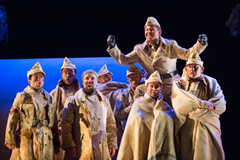| Opera Reviews | 5 May 2024 |
ETO does justice to rare Donizettiby Catriona Graham |
|
| Donizetti: L'Assedio di Calais English Touring Opera Perth Festival of the Arts May 2013 |
|
|
The battle of Stalingrad is where director James Conway and designer Samal Blak have set English Touring Opera's production of this rarely-performed opera. The stage is covered with broken concrete paving and a section of two-metre diameter concrete pipe - at first a wall, then a shelter for the besieged citizens. Bundles of clothes hang from wire, like body parts blown apart by explosions. The opera opens in the besiegers' camp, where someone comes to steal bread and is caught. Blindfolded, he is toyed with, threatened with a firing squad, then released to take back to the city a message from the commander that he is about to attack. The commander Edoardo (the historical Edward III of England) sings of his desire to take the city in a jolly tune with oom-pa-pa rhythms - initially shocking but, on further thought, quite right; so many squaddie songs are jaunty little numbers. This aria has been relocated from the cut Act 3 in this version, and works. Back in the city, a young woman with her baby and her father-in-law are convinced the bread thief is dead. Eddie Wade invests Eustachio, the leader of the city, with gravitas. As Eleonora, his daughter-in-law, Paula Sides is steely yet vulnerable, clutching her son tightly. But the missing man returns safely. Aurelio is a trouser role, and Helen Sherman's vague resemblance to David Beckham adds credibility to the high voice. Aurelio is full of fervour - for life, love, his son, his country, death and glory - and Sherman's rich mezzo colours these emotions with humanity. Piotr Lempa, as the Stranger, is a rabble-rouser on a soap-box, inciting rebellion against Eustachio to speed up the surrender. When the messenger Edmondo (Adam Tunnicliffe) arrives with Edoardo's terms for surrender, the citizens reject them loudly. Yet, while Aurelio holds forth in pompous braggadocio, there is a finely-played mute conversation between Sides and Wade, after which Eustachio reminds them of the danger to their women and children of fighting to the death. The six nobles who volunteer for execution to save the city - Wade, Sherman, Stuart Haycock (Giovanni D'Aire), Brendan Collins (Pietro De Wisants), Niel Joubert (Giacomo De Wisants) and Matthew Sprange (Armando) - sing the close harmony of "O sacra polvere" with heart-rending intensity. Albeit helped by Donizetti's melodic line, in the final duet between Aurelio and Eleonora, Sides really sounds as if she is sobbing, not just singing. Given the size of the chorus, it can produce a tremendous volume, whether as English soldiers, citizen-defenders or the women of the town. In the prelude to Act 2, a solo oboe stands out from the orchestral texture, evoking the calm of breaking dawn and bird-song, then duets with Eleonora singing as Aurelio sleeps. Throughout, the orchestra, conducted by Jeremy Silver, plays with a lightness which suits the dancing rhythms of the music. Overall, the production makes a robust argument for including this work in the standard repertoire |
|
| Text ©
Catriona Graham Photo © Richard Hubert Smith |

 As if we needed reminding how universally topical Donzetti's L'Assedio
di Calais is, the recent news from Syria has not been good.
As if we needed reminding how universally topical Donzetti's L'Assedio
di Calais is, the recent news from Syria has not been good. 





